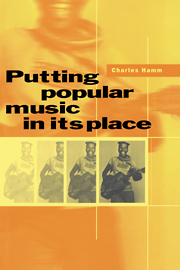Book contents
- Frontmatter
- Contents
- Acknowledgements
- Preface
- 1 Modernist narratives and popular music
- 2 Rock and the facts of life
- 3 Changing patterns in society and music: the US since World War II
- 4 “If I Were a Voice”: or, The Hutchinson Family and popular song as political and social protest
- 5 Some thoughts on the measurement of popularity in music
- 6 Elvis, a review
- 7 Home cooking and American soul in black South African popular music
- 8 Rock ‘n’ roll in a very strange society
- 9 African-American music, South Africa, and apartheid
- 10 “The constant companion of man”: Separate Development, Radio Bantu, and music
- 11 Privileging the moment of reception: music and radio in South Africa
- 12 Music and radio in the People's Republic of China
- 13 Towards a new reading of Gershwin
- 14 A blues for the ages
- 15 Graceland revisited
- 16 Dvořák in America: nationalism, racism, and national race
- 17 The last minstrel show?
- 18 The Role of Rock, a review
- 19 Genre, performance, and ideology in the early songs of Irving Berlin
- 20 Epilogue: John Cage revisited
- Index
17 - The last minstrel show?
Published online by Cambridge University Press: 05 February 2012
- Frontmatter
- Contents
- Acknowledgements
- Preface
- 1 Modernist narratives and popular music
- 2 Rock and the facts of life
- 3 Changing patterns in society and music: the US since World War II
- 4 “If I Were a Voice”: or, The Hutchinson Family and popular song as political and social protest
- 5 Some thoughts on the measurement of popularity in music
- 6 Elvis, a review
- 7 Home cooking and American soul in black South African popular music
- 8 Rock ‘n’ roll in a very strange society
- 9 African-American music, South Africa, and apartheid
- 10 “The constant companion of man”: Separate Development, Radio Bantu, and music
- 11 Privileging the moment of reception: music and radio in South Africa
- 12 Music and radio in the People's Republic of China
- 13 Towards a new reading of Gershwin
- 14 A blues for the ages
- 15 Graceland revisited
- 16 Dvořák in America: nationalism, racism, and national race
- 17 The last minstrel show?
- 18 The Role of Rock, a review
- 19 Genre, performance, and ideology in the early songs of Irving Berlin
- 20 Epilogue: John Cage revisited
- Index
Summary
First given as a paper at a joint conference of the American Musicological Society, the Society for Ethnomusicology, and the American branch of the International Association for the Study of Popular Music, held in Chicago in the fall of 1991, this essay brings my work back home. After years of trying to understand the context of popular music from the past, and in such remote parts of the world (for me) as South Africa and the People's Republic of China, I set out to examine the meaning of a contemporary musical event in a small village near my home in Vermont.
Even though the minstrel show is thought to have died out by the middle of the twentieth century, the Civic Club of Tunbridge, a small town in central Vermont, has produced one every year for the last four decades. It may be the last minstrel show.
Why has even one minstrel show survived to the present day? Why here, in a village in northern New England? How is this show related, dramatically and musically, to the nineteenth-century minstrel stage? What is its meaning in the contemporary world? These are questions to be explored in this paper, based on an analysis of the 39th annual show given in March of 1991.
Description of the show
The Tunbridge minstrel show is held in late winter in the auditorium of the town hall, seating some 200 people.
- Type
- Chapter
- Information
- Putting Popular Music in its Place , pp. 354 - 366Publisher: Cambridge University PressPrint publication year: 1995

